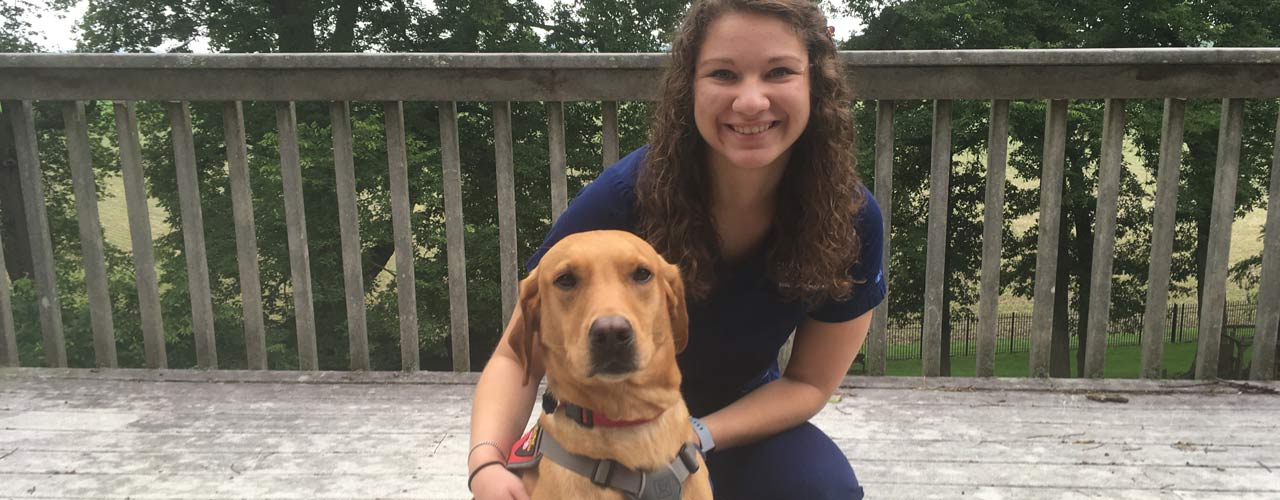by Clem Boyd, Communication Content Manager
When Victoria Denen stepped into Soin Medical Center in Beavercreek on July 9 for her first day as a nurse, she could thank parents, siblings, extended family and friends for their support. But one pal in particular went the “extra Milo.”
Denen, a 2019 graduate of Cedarville University, is also a Type 1 diabetic. Her faithful friend Milo, a yellow Labrador retriever service dog, walked alongside, curled up nearby and gave her timely puppy paw alerts that her blood sugar was too high or too low throughout her undergraduate studies.
— Angie Mickle
Denen and Milo’s partnership began just a week before she attended Cedarville’s nursing camp, which is held every June. Nursing camp is an opportunity for high school juniors and seniors to preview the nursing profession and the nursing program at Cedarville.
“It was a little stressful, to be honest, because we were brand-new to each other,” Denen said. “But everyone at the camp was really nice. On the first day, Karen Callan (coordinator of nursing lab and facilities) was running the camp, and she asked me if there was anything they could do to help make the transition easier. Everyone was just so considerate and helpful.”
Her camp experience propelled her to apply to Cedarville’s nursing program. “I knew that’s what I wanted to do after camp,” Denen said. “They helped me see nursing as servanthood to others, and they prepared us well with the skills and the ability to think critically.”
One year after camp, Denen and Milo arrived at Cedarville for the first full day of classes. Everyone was very accepting of Milo, and many were in “aww” of him when he would give Victoria a puppy-paw alert.
“Most people assumed he was one of the 4 Paws dogs in training,” Denen said, referring to the Xenia-based 4 Paws for Ability, Inc., which trains service dogs for veterans and special needs children. Students are 4 Paws trainers, and the pups are a regular feature on Cedarville’s campus. Milo actually came from an organization in Texas that specializes in training dogs for diabetics.
“People would ask me about how he worked and what he does, and it was cool to share his training,” she continued. “He would put his paw on me, and it kind of looks like a dog handshake or something like that, and people would say, ‘He’s so cute,’ and I’d say, ‘Oh yeah, that’s an alert.’”
Because of Milo’s sensitive sniffer, he can detect changes in Denen’s body chemistry that indicate her blood sugar is elevated or low. “I check my blood sugar with a glucose monitor, and then depending on if it’s high or low, I either give myself insulin if it is high, or eat a snack if it’s low. And then I give him a big puppy party.”
A puppy party? “I don’t think he associates an alert as something that’s wrong with me,” Denen explained. “He just knows that if he identifies it, he gets treats. So I throw a ball for him, and I give him all the credit, so it’s a really exciting thing for him to alert.”
While the immediate effect for Milo is a lot of fun, the lasting impact for Denen is life-changing. If her blood sugar is too low, she could pass out or have a seizure. If her blood sugar is too high, she can have trouble focusing in the short term, and the outcome down the road could be kidney problems, peripheral neuropathy (numbness in the limbs), blindness, hypertension and stroke.
“So it’s really important to have a good, tight control of that, and Milo helps me with that,” Denen said.
“Victoria changed my vision of nurses with a healthcare need who have a service dog,” said Angie Mickle, dean of the Cedarville School of Nursing. “Victoria was a leader in our nursing program. She was involved in the Student Nursing Association and took part in every activity we did. She taught everybody the whole time she was here being taught. I was impressed by her perseverance from nursing camp to graduation.”
Denen’s first job is working on a medical/surgical unit at Soin, so she will have to track her blood sugar without Milo’s help on the job. But her long-term goals include working with newly diagnosed diabetic patients.
“Having diabetes is part of what gave me the passion for nursing,” she said. “I really want to work with them and tell them it’s not the end of the world, and you can still have a normal life with diabetes. I think it could be a cool ministry.
“And if I’m working in a children’s hospital with diabetics, and they let me bring Milo in, that could be cool for them to interact with a service dog and see how helpful he is. That’s what got me into nursing, and that’s what I would love to do.”
Imagine the puppy parties then.
Located in southwest Ohio, Cedarville University is an accredited, Christ-centered, Baptist institution with an enrollment of 4,193 undergraduate, graduate and online students in more than 150 areas of study. Founded in 1887, Cedarville is recognized nationally for its authentic Christian community, rigorous academic programs, including its doctor of pharmacy, master’s in global public health, M.S.N. family nurse practitioner, healthcare mba, pharmd/mba dual degree, and M.S.N. nurse educator programs, strong graduation and retention rates, accredited professional and health science offerings and leading student satisfaction ratings. For more information about the University, visit www.cedarville.edu.


















